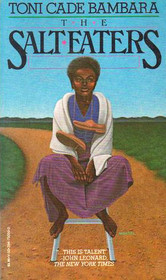Velma Henry sits in a room in the Southwest Infirmary in Claybourne, Georgia, being treated by a healer after slitting her wrists and putting her head in a gas oven. The healer, Miss Minnie, is arguing with her spirit guide, an old friend she calls Old Wife, while the loa--the spirits of Vodou--gather around. Outside in Clayborne, a Mardi Gras festival is going on, where the organization Velma has committed her life to, a social justice outfit called the Academy for the Seven Arts, may be planning an attack with a cache of stolen weapons on the insidious Transchemical plant where Velma has been working as a spy. A dozen or so other characters--members of the Academy, chemical engineers, bus drivers, and doctors--go on about their business, unaware of the way in which their lives are interwoven with Velma's as she fights--or doesn't--for life.
One of the remarkable things about The Salt-Eaters is that the entire novel takes place over a couple of hours at most; it seems to sit on the head of a pin. Bambara floats freely from one consciousness to another, hopping from Velma's brain to Miss Minnie's to all the others. It has the feeling of the quiet stillness before a storm, and a storm does come, a sudden outpouring of thunder and rain that's somehow associated with the loa, and which may usher in a new world, free of racism, capitalism, patriarchy, and ecological disaster. The Salt-Eaters, for all its experimental weirdness, is a book that's really about the drudgery and praxis of social change. It's factionalism, opportunism, and inefficacy in her movement that has driven Velma to despair; in her memories we see bus drives, petition drives, fights over parliamentary rules. Bambara seems to suggest that real change is possible in a world where social organization is married to spiritual awakening of some kind.
I'll tell you, I didn't expect this novel to be what it was. I like to teach some of Bambara's stories, including "The Lesson" and "Raymond's Run," which are typically about black children in urban environments. Those stories are persuasive bits of social realism, but The Salt-Eaters explodes all that in favor of shifting viewpoints, disorienting narratives, and disjointed time. It's sort of a glorious mess; I loved reading it though I'm not sure I understood half of it on a real literal level. A more conventional narrative might have helped me follow the track of what Bambara's saying about social change, but it probably would have made for a much more ordinary reading experience, and wouldn't have resounded with life, as Bambara's Claybourne does.


No comments:
Post a Comment